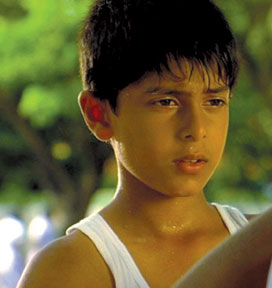Vidu - once again
 As a habit, director 'Sorrowless Moon village' (Asoka Handagama) is
given to making censors hot under their collar. As a habit, director 'Sorrowless Moon village' (Asoka Handagama) is
given to making censors hot under their collar.
And, very hot at that.
But in his current cinematic skirmish, he makes a surprising detour.
His unmistakable intention in his latest work, is to warm the hearts of
film-goers. It is quite clear that the director and the producers
planned to make this a kind of minor tear-jerker, leading to the
stirring of the softer emotions of the viewers.
The director has assembled all the adjuncts that ensure the success
of a children's film. You have the relentless, hard-hearted villain.
This role is filled by Saumya Liyanage who personifies an ethic-less
political boss, committed to stake anything, to grab his avowed goal.
Then there is the saintly hero, who will uphold truth and justice -
come what may. This is where Gamini Hettiarachchi steps in, as the
highly principled principal of a college. Peer-group support is
essential to solicit juvenile sympathy for the child hero. It is amply
provided.
Then there is of course the starkly and utterly helpless mother who
is ready to sacrifice her all, for the sake of her child's well-being.
This is where Chandeni Seneviratne makes her appearance.
With all that, a nagging doubt tends to trouble the film-goers. Fully
aware of the antecedents of this specific film-director, they cannot
help but wonder if the director here is a ferocious cat observing high
percepts of peace.
 |
|
A scene from the movie
|
When will this cat pounce upon the mouse? This hesitation is quite
tenable.
Almost as a rule, he has been smashing convention in his previous
works. He batters ethical concepts. He up-ends time-honoured notions. He
declares his own form of war, against what he perceives as injustice. He
exhibits an urge to probe areas of life, which the generality of men and
woman would rather not talk about.
In his present work "Vidu", director Asoka Handagama has not totally
got rid of his pet preoccupation.
In Vidu, the Director wields the child-hero Vidu as a cudgel to beat
up what he sees as injustice and hypocrisy.
The child-hero Vidu (T. G. Wimalaratne) is introduced initially to
the audience as a little child of school-going age. There is nothing
remarkable about that. The departure from the norm, sets in from then
on. The doting mother is a thief. She picks convenient pockets.
Personality quirks begin to accumulate. The child is precocious. In a
monolingual social context, his English has a stunning effect. The child
is not admitted to school, because the mother cannot provide the name of
the child's father.
The mother pursues her "profession". Eventually, authorities relent
and the child is found a school.
The villainous streak is brought in by political campaigners. Saumya
Liyanage cast as the political boss, is a bearded, paunchy personality.
I am really intrigued why the director and his people made the prominent
paunch of the villainous boss, an essential part of his anatomy.
Cassius, one of the villains who plotted to assassinate Caesar, was
"thin and hungry looking". Is director Asoka Handagama standardizing the
appearance of villains?
As the story-line progresses the child becomes (figuratively) the
infant in the Chalk-Circle. He is pulled hideously by the gangsters of
the political boss. The mother and the righteous forces behind her,
attempt to rescue him.
The director does not, in any way, intend to make a profound analysis
of the injustice a child is victim to. He adds on episodes, incidents,
situations and sequences and makes it seem that he is in a hurry to get
on with it. In many an instance, the transition from one sequence to
another is not seamless. The cinematic smoothness of the flow of the
narration is not given priority. Instead the need to insert scenes and
sequences, takes primary significance.
Asoka Handagama, presents an impactful cinematic work. With the ample
talents in his repertoire, one may very well ask why not the best.
One particular area, that will keep on troubling the film-goer, is
the limited effort made to establish the child's early years. In a
series of brief "cuts" done, at flash-back level, the child's
development could have been registered. This would have given the
audiences a greater sense of fulfilment.
The major roles are played by a trio, who are of established Ihespian
stability. Saumya Liyanage, Gamini Hettiarachchi and Chandani
Seneviratna, bear heavy acting burdens.
The story hints at a secret liaison between the political boss and
the child's mother, that resulted in the heroic offspring. This aspect
of the plot, is merely presented in passing. The director was perhaps
interested in emphasizing the viciousness of the political boss and the
admirable heroism of the mother.
The publicity area of the film, pathetically underlines, some of the
negative aspects of cinema in our day. The producers probably thought,
that the child-hero could be made the nucleus of a 'cult' - something
like a distant echo of Harry Potter perhaps. But, the field of cinema
cannot yield that kind of enthusiastic film - patronage now-a-days.
This way Vidu rubs in an important lesson. We should create a cinema
culture in which, many, crowd-pleasing high-quality films are made
elevating some into cult level. As for Vidu, it marks a new arrival for
director Ashoka Handagama.
He has made an effort here, to break away from the confining and
restricting thematic cocoons.
He could, transit into a phase in which he will entertain and educate
the film-going masses, through a new found cinematic vigour and a
freshly acquired inspiration.
|

